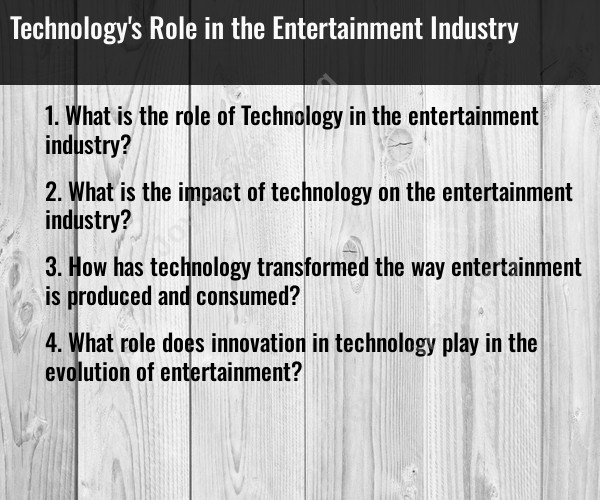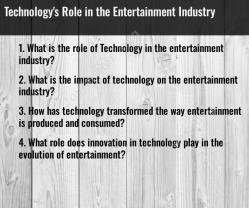What is the role of Technology in the entertainment industry?
Technology plays a fundamental and transformative role in the entertainment industry, shaping how content is created, distributed, consumed, and experienced. Here are some key aspects of technology's role in the entertainment industry:
Content Creation and Production:
- Digital Filmmaking: High-definition cameras, digital editing software, and computer-generated imagery (CGI) have revolutionized filmmaking, enabling creators to produce high-quality content more affordably.
- Digital Audio Production: Advanced recording equipment and software have transformed music production, making it easier for artists to create, edit, and distribute their music.
- Animation and Special Effects: Technology has advanced animation and special effects, leading to visually stunning and immersive experiences in movies, TV shows, and video games.
Content Distribution:
- Streaming Services: The rise of streaming platforms like Netflix, Amazon Prime Video, and Disney+ has transformed how content is distributed, allowing viewers to access a vast library of content on-demand.
- Online Marketplaces: Platforms like iTunes, Google Play, and Amazon have revolutionized the distribution of music, movies, and eBooks.
- Social Media: Social media platforms play a role in content distribution by enabling creators to share their work and engage with their audiences directly.
Virtual and Augmented Reality (VR/AR):
- VR and AR technologies have opened up new dimensions for storytelling and gaming, offering immersive experiences that blur the line between the digital and physical worlds.
Video Games:
- Video game technology has evolved rapidly, leading to increasingly realistic graphics, advanced gameplay mechanics, and online multiplayer experiences.
Live Entertainment:
- Technology has enhanced live events with state-of-the-art sound systems, lighting, and projection technology, providing audiences with unforgettable experiences at concerts, sporting events, and theater productions.
Data Analytics:
- Data-driven insights help entertainment companies understand audience preferences, enabling personalized recommendations and targeted marketing.
Digital Effects and Post-Production:
- Post-production technology allows for color correction, sound mixing, and visual effects, enhancing the overall quality of content.
Content Accessibility:
- Assistive technologies and subtitles have made entertainment content more accessible to individuals with disabilities, ensuring a broader audience can enjoy the content.
Piracy and Copyright Protection:
- Technology also plays a role in copyright protection and anti-piracy measures, helping creators and studios protect their intellectual property.
Fan Engagement:
- Social media, mobile apps, and online communities enable fans to engage with their favorite content, actors, musicians, and creators, fostering a sense of community and loyalty.
Marketing and Promotion:
- Digital marketing, social media advertising, and data analytics are used to target specific demographics and promote entertainment content effectively.
Content Recommendation Algorithms:
- Streaming services use algorithms to recommend content to viewers based on their viewing history and preferences, increasing user engagement.
Innovative Storytelling Formats:
- Technology, such as interactive storytelling apps and virtual reality experiences, has introduced new formats and narrative techniques that engage and immerse audiences in unique ways.
Globalization:
- The internet and digital distribution have facilitated the globalization of the entertainment industry, making it easier for content to reach international audiences.
Sustainability:
- The industry is increasingly exploring sustainable practices in production and distribution to reduce its environmental impact.
Overall, technology continues to reshape the entertainment industry, offering new opportunities for creativity, reaching wider audiences, and enhancing the overall quality and accessibility of entertainment content. As technology continues to advance, it will likely bring further innovations and changes to how entertainment is created and enjoyed.
What is the impact of technology on the entertainment industry?
Technology has had a profound impact on the entertainment industry. It has transformed the way entertainment is produced, distributed, and consumed.
Some of the key impacts of technology on the entertainment industry include:
- New forms of entertainment: Technology has enabled the creation of new forms of entertainment, such as video games, streaming services, and social media.
- New ways to consume entertainment: Technology has made it possible to consume entertainment in new ways, such as on-demand streaming, mobile devices, and virtual reality.
- More personalized experiences: Technology has enabled the creation of more personalized entertainment experiences, such as recommendations based on viewing history and custom playlists.
- Global reach: Technology has made it possible to distribute entertainment to a global audience more easily and cheaply than ever before.
How has technology transformed the way entertainment is produced and consumed?
Technology has transformed the way entertainment is produced and consumed in a number of ways.
Production: Technology has made it possible to create more realistic and visually stunning special effects, and to produce content more efficiently and cheaply. For example, computer-generated imagery (CGI) is now widely used in films and television shows to create realistic animals, monsters, and environments. Additionally, digital editing and post-production techniques have made it possible to create complex and sophisticated visual effects.
Consumption: Technology has made it possible to consume entertainment in new and convenient ways. For example, streaming services such as Netflix and Hulu allow viewers to watch movies and TV shows on demand, without having to wait for them to be broadcast. Additionally, mobile devices such as smartphones and tablets have made it possible to consume entertainment on the go.
What role does innovation in technology play in the evolution of entertainment?
Innovation in technology plays a vital role in the evolution of entertainment. As new technologies emerge, they open up new possibilities for creating and consuming entertainment.
For example, the development of virtual reality (VR) and augmented reality (AR) has created new possibilities for immersive and interactive entertainment experiences. VR allows viewers to step into virtual worlds, while AR overlays digital information on the real world. These technologies are still in their early stages of development, but they have the potential to revolutionize the entertainment industry.
Another example of innovation in technology that is transforming the entertainment industry is the rise of artificial intelligence (AI). AI is being used to create new forms of entertainment, such as interactive stories and personalized recommendations. Additionally, AI is being used to improve the production and distribution of entertainment content. For example, AI is being used to develop new special effects and to create more efficient ways to distribute content.
Overall, technology is playing a major role in the evolution of the entertainment industry. As new technologies emerge, they are opening up new possibilities for creating and consuming entertainment.
Here are some specific examples of how innovation in technology is transforming the entertainment industry:
- Netflix is using AI to personalize recommendations for its subscribers.
- Disney is using VR to create immersive experiences for its theme park visitors.
- Google is developing AR glasses that will overlay digital information on the real world.
- Amazon is using AI to generate new TV shows and movies.
These are just a few examples of how innovation in technology is transforming the entertainment industry. As technology continues to evolve, we can expect to see even more innovative and exciting forms of entertainment in the future.


